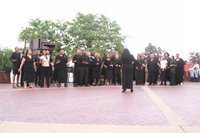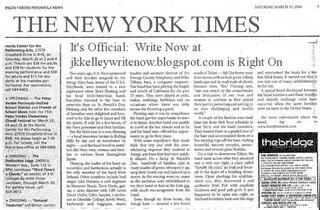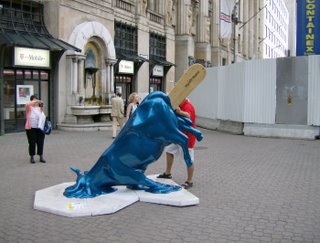I picked up a copy of Robinson's novel
Gilead after it was recommended to me by a literary agent at the Grub Street conference. The agent had read a sample of my novel and suggested Robinson's work as an author I could learn from. As I made my way through the text I noted her flawless prose and use of details. I also read to notice how Robinson makes use of a first person narrator. My own work is currently told from the first person and I find that I need more writerly tools to make the most of his point-of-view.
Gilead is a ponderous novel. It is an epistolary novel written by a 76 year-old pastor in 1956 Iowa to his seven-year-old son. The pastor is near death and wants to write to his son who will not remember him after his death.
I finished the novel a few weeks ago and only today picked up my copy to give it more thought. As I paged through and reread sections, I was impressed more deeply by the language and the ideas in the novel. So please forgive the extensive excerpts. (I actually left out sections that were noteworthy!)
Memorable Quotes
(hardcover first edition, 2004)
I told you last night that I might be gone sometime, and you said, Where, and I said, To be with the Good Lord, and you said, Why, and I said, Because I’m old, and you said, I don’t think you’re old. And you put your hand in my hand and you said, You aren’t very old, as if that settled it. I told you might have a very different life from mine, and from the life you’ve had with me, and that would be a wonderful thing, there are many ways to live a good life. And you said, Mama already told me that. And then you said, Don’t laugh! because you thought I was laughing at you. You reached up and put your fingers on my lips and gave me that look I never in my life saw on any other face besides your mother’s. It’s a kind of furious pride, very passionate and stern. I’m always a little surprised to find my eyebrows unsinged after I’ve suffered one of those looks. I will miss them. (Opening paragraph)
You can know a thing to death and be for all purposes completely ignorant of it. A man can know his father, or his son, and there might still be nothing between them but loyalty and love and mutual incomprehension. (p 7)
There is a reality in blessing, which I take baptism to be, primarily. It doesn’t enhance sacredness, but it acknowledges it, and there is a power in that. (p 23)
That was the first time in my life I ever knew what it was to love another human being. Not that I hadn’t loved people before. But I hadn’t realized what it meant to love them before. (p 55)
I was always amazed, watching grownups, at the way they seemed to know what was to be done in any situation, to know what was the decent thing. (p 95)
So you must not judge what I know by what I find words for. (p 114)
There is something in her face I have always felt I must be sufficient to, as if there is a truth in it that tests the meaning of what I say. (p 137)
But I believe that the rewards of obedience are great, because at the root of real honor is always the sense of the sacredness of the person who is its object. (p 139)
And often enough, when we think we are protecting ourselves, we are struggling against our rescuer. (p 154)
Because nothing true can be said about God from a posture of defense. (p 177)
My custom has always been to ponder grief; that is, to follow it through ventricle and aorta to find out its lurking places. (p 179)
The tact was audible. (p 186)
I don’t know exactly what covetise is, but in my experience it is not so much desiring someone else’s virtue or happiness as rejecting it, taking offense at the beauty of it. (p 188)
One interesting aspect of the whole experience was that I simply could not be honest with myself, and I couldn’t deceive myself, either. (p 203)
. . . that was the first time in my life I ever felt I could be snatched out of my character, my calling, my reputation, as if they could just fall away like a dry husk. (p 205)
Love is holy because it is like grace—the worthiness of its object is never really what matters. (p 209)
There is no justice in love, no proportion in it, and there need not be, because in any specific instance it is only a glimpse or parable of an embracing, incomprehensible reality. It makes no sense at all because it is the eternal breaking in on the temporal. So how could it subordinate itself to cause or consequence? (p 238)
There are a thousand thousand reasons to live this life, every one of them sufficient. (p 243)
It seems to me that when something really ought to be true then it has a very powerful truth, which starts me thinking again about heaven. (p 244)
A Few Good Words
susurrus: etymology: Latin, hum, whisper; a whispering or rustling sound
crepuscular: of, relating to, or resembling twilight OR active in the twilight
Model sentences
Here I am trying to be wise, the way a father should be, the way an old pastor certainly should be. (p 56)
I feel sometimes as if I were a child who opens it eyes on the world once and sees amazing things it will never know any names for and then has to close its eyes again. (p 57)
In any case, it felt so necessary to me to walk up the road. . . . (74)
I was standing there, taking it in, trying to decide what to do, when the old man wheeled around and planted that stare on me. (p 98)
I conceal my motives from myself pretty effectively sometimes. (p 147)
Your mother looked at me, so I knew I must have sounded upset. I was upset. (p 152)
Useful Links










